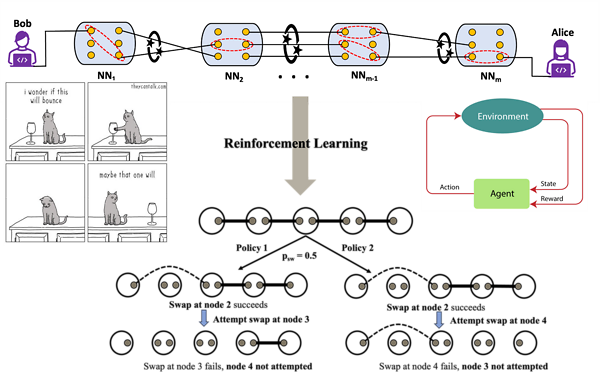Policies for entanglement distribution in quantum networks: theory and practical performance analysis

Date
Location
Description
27 February 2024
Title: Policies for entanglement distribution in quantum networks: theory and practical performance analysis
Speaker: Mr. Stav Haldar, Louisiana State University
Abstract of Talk: We begin by discussing the role of policies in improving figures of merit of a near-term quantum network constituted by imperfect repeaters, memories, and channels. We then formulate the problem of finding optimal policies as a Markov decision process (MDP) and use reinforcement learning (RL) techniques for the optimization. RL-derived policies have several common features that make them advantageous. We quantify some of these features, namely, use of global knowledge of the network state, foresight, collaboration between different nodes and dynamic cutoff for memories. These RL-derived policies can be used to develop simple heuristics and be applied to large networks in a scalable way, e.g., by nesting. As a specific example, we will develop some simple multiplexing policies which utilise “quasi-local” knowledge of the network state. I will also highlight the role of classical communication (CC) costs and show that utilising knowledge of the network state effectively can reduce waiting times and increase end-to-end fidelities, compared to fully-local policies, even when the CC costs associated with such knowledge are accounted for.
Our policies also make use of entanglement distillation. We demonstrate via simulations one of our key findings, which is that these policies can outperform the well-known and widely studied nested purification and doubling swapping policy in practically relevant parameter regimes. We identify the parameter regimes in which performing distillation makes sense and is useful. In these regimes, we also address the question: “Should we distill before swapping, or vice versa?” We thus formalise the trade-off between the advantages of adding distillation capabilities to quantum networks against their technological and practical challenges.
To make our studies more realistic, we will provide a reasonable prescription to translate the simulation figures of merit to real experimentally measurable numbers for some examples of fibre optic channel-based terrestrial and satellite-assisted free space channel-based near-term quantum networks.
Profile of Speaker: I am a graduate student in the Department of Physics and Astronomy at Louisiana State University working on theory and simulation of terrestrial and space-based quantum networks. My other research interests include critical phenomena and dynamics of many-body quantum systems, quantum optics and its interplay with gravity, and interferometry utilizing non-classical states of light.
Subscribe to the OIST Calendar: Right-click to download, then open in your calendar application.



